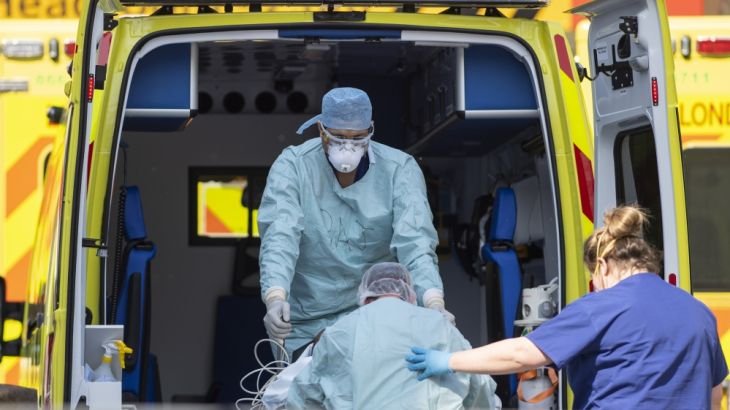Coronavirus deaths in the UK exceed 10,000
Fears grow that the UK will end up as the country with the most virus deaths in Europe.

The number of coronavirus-related deaths in the United Kingdom has exceeded 10,000.
A further 657 people died in hospitals in England and 369 in Wales. In Scotland, the new overall toll stood at 566, while Northern Ireland reported a new total of 118, bringing the total death toll in Britain to 10,647.
Keep reading
list of 3 itemsNew coronavirus outbreak: Facts and myths
Coronavirus: Which countries have confirmed cases?
With virus death tolls in Italy and Spain on a downward slope, there are growing fears that the UK will end up as the country with the most virus deaths in Europe.
Jeremy Farrar, director of the Wellcome Trust and a scientific adviser to the British government, said the UK was likely to be “one of the worst, if not the worst-affected, country in Europe”.
He told the BBC that the UK has “lessons to learn” from Germany, where much more widespread early testing and aggressive contact tracing have been accompanied by many fewer coronavirus deaths.
Last week, the British government’s chief scientific adviser, Patrick Vallance, warned that the daily number of deaths would likely increase for a couple more weeks.
Lockdown
Britain has been in effective lockdown since March 23 and the government will extend the restrictions later this week.
But the conservative government has come under fire for its slow response to confronting the pandemic – allowing tens of thousands to gather at the Cheltenham horse racing festival in mid-March, for example.
|
|
It has also faced criticism for its slow rollout of a coronavirus testing programme.
In the past few days, the government also faced acute criticism over a lack of personal protective equipment for frontline hospital workers amid reports that some nurses had resorted to cutting up garbage bags to cover themselves.
Health Secretary Matt Hancock revealed on Saturday that 19 frontline medical workers have died of the virus.
The Royal College of Nursing has piled more pressure on the government, urging members to refuse to treat patients as a “last resort” if adequate protections are not provided.
Business Secretary Alok Sharma stopped short on Sunday of apologising for the shortage of medical masks and gowns but said it is “absolutely right that no medical professional should be placed in a position where they have to make that choice”.
“That is why we are making sure we get the equipment to the frontline,” he told Sky News.
Also on Sunday, British Prime Minister Boris Johnson was discharged from hospital after being treated for COVID-19.
In his first statement since recovery, Johnson thanked the country’s National Health Service, saying he owed them his life.